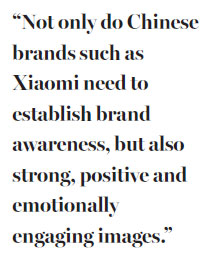Chinese brands making a silent break
Updated: 2016-09-30 04:53
By Mike Bastin(China Daily Europe)
|
|||||||||
Targeted marketing and choosing proven, trustworthy partners and suppliers are features of the new approach to UK market
Chinese companies continue to grab international media headlines with ever-more audacious acquisitions of Western companies and their brands.
But the step-by-step breakthrough in Western markets by Chinese brands that have eschewed growth strategies based on purchasing foreign brands has been hidden from the public eye - until now.

It appears Chinese brands are not only targeting the more lucrative markets in Western Europe and North America, but they are doing so with increasing skill and professionalism. Premium brand building lies at the heart of their strategies to penetrate Western markets.
But perhaps the key reason behind Western market penetration is the sheer determination to succeed. Like the global car rental brand Avis who, for 50 years, used the iconic tagline "We are No 2 (behind Hertz), we try harder", Chinese companies are accepting their "Avis predicament", where breaking down skepticism is a major challenge.
The position in which Chinese brands find themselves is entirely understandable given decades of domestic economic growth fuelled primarily by a low-production and low-pricing approach. But the days of simply targeting other emerging nations with low-priced Chinese brands have gone.

Gone also are the days of simply sitting back and basking in the dominance of the Chinese mainland market. Companies such as Huawei and Tencent continue to enjoy almost impenetrable market positions at home, but they possess a rapacious appetite expansion in Western markets, too.
Previously, the mantra "nothing fails like success" could have been applied to domestically dominant Chinese brands, but that is no longer the case.
Chinese companies are building their brands in the West on trust, which is key to any initial brand-building approach.
Nowhere is this newfound self-belief and determination more pervasive than in China's rapidly internationalizing technology sector.
Tencent, the internet giant that owns the WeChat messaging app, is a prime example. First, the company has deliberately chosen to grow without the need for acquisitions of major foreign brands, and yet it displays dedication and determination in all aspects of its international expansion.
According to Millward Brown's 2016 Brand Z Top 100 Most Valuable Global Brands, Tencent is worth a staggering $85 billion. To put that into perspective, it should be noted that the figure is a full $5 billion more than the valuation of Coca-Cola and twice that of Nike.
But Tencent's meteoric rise, still mainly the result of domestic market penetration, has not dampened its determination to expand further in the West, with WeChat a central pillar of its strategy.
Tencent's international ambitions and professional approach appear to be matched by another Chinese tech giant, e-commerce brand JD.com.
Despite this promising position for Chinese brands in Western markets, the challenges remain substantial. That was the general message that came out of a recent survey of consumers in Britain by market researcher Qualtrics.
The survey, focused on perceptions of Chinese brands, found that 38 percent of British respondents said they have questioned the credibility and authenticity of a Chinese brand, mainly as a result of a lack of trust and concerns over quality and unethical production methods. However, even these negatives appear to be - at least partly - the result of an overall lack of brand awareness.
Perhaps most tellingly, the survey found that Chinese brands do not currently enjoy "top of mind awareness" with British consumers. While the brand awareness figures reported represent a sizeable improvement during recent years, they also highlight the challenges facing Chinese companies as they look to deepen market penetration and brand building in Britain.

The survey was more favorable for more-established Chinese brands in the UK market such as Lenovo, with an awareness rating of 83 percent, and Huawei, with 73 percent.
But for newcomers to the market, the survey highlighted the need to pay real attention to brand-awareness ratings. For example, 55 percent of those surveyed had never heard of Chinese conglomerate Alibaba, while Xiaomi, a little-known consumer electronics manufacturer that has awareness rating of just 26 percent, has to demonstrate real determination.
Not only do Chinese brands such as Xiaomi need to establish brand awareness, but also strong, positive and emotionally engaging images.
Fortunately for Xiaomi and many others in a similar position, a number of brand-role models have achieved a powerful, emotional position in the minds of Western consumers.
Premium pricing is often a necessary part of emotional brand positioning, and Chinese consumer electronics giant Huawei, with its P9 smartphone pricing range (on a par with Samsung and Apple's flagship brands) is an excellent example for other Chinese brands to follow in their endeavors to expand internationally.
Furthermore, to build awareness and emotional attachment in the West, Huawei enlisted Hollywood actors Scarlett Johansson and Henry Cavill to lead the April launch of its P9 smartphone.
Of course, there is no "one best way" for Chinese companies to create this global brand identity, and a growing number are demonstrating real independence and innovation in their global brand building efforts.
For example, recent rhetoric from Lenovo's leadership makes it clear that what it often referred to as "agnostic branding" now fits its approach to the global marketplace. Lenovo, while still retaining its Chinese heritage and culture, presents itself as a global brand and a Chinese brand that's aiming to go global. This is much more than an outward promotional picture.
Not just seeing itself as a Chinese brand provides demonstrable proof of genuine confidence and determination to succeed globally and should lead to a less-ethnocentric attitude toward different national and regional cultural environments.
Creating a global identity and awareness for the newest Chinese brands will also require innovative thinking and promotion.
Smartphone startup OnePlus deserves to be commended for adopting just such an approach. Shunning traditional marketing promotion campaigns, Kyle Kiang, global head of marketing, decided on a novel approach to building brand awareness in Europe. Under its "Never Settle" positioning, OnePlus has built brand awareness during the past two years through word-of-mouth marketing, and until recently sold its phones exclusively to customers who requested an invitation to purchase.
Kiang has made it clear that traditional marketing promotions, with an annual advertising spend of about 100 million pounds ($130 million; 115 million euros), will continue, but that, as a Chinese company fighting for brand awareness, quirky, creative activities will break down barriers effectively.
Focused, targeted marketing and the choice of proven, trustworthy partners and suppliers are also features of the new approach to UK and Western market penetration adopted by an increasing number of Chinese companies.
For example, Chinese companies are firmly setting their sights on the UK's millennials, easily the "heaviest" consumers of technology brands.
British and European companies must become more aware of the changes taking place inside Chinese companies and their desire to form lasting, mutually beneficial relationships with Western counterparts.
While Chinese companies are increasingly fearless, they are certainly not to be feared.
The author is a visiting professor at the University of International Business and Economics in Beijing and a senior lecturer at Southampton University. The views do not necessarily reflect those of China Daily.
(China Daily European Weekly 09/30/2016 page12)
Today's Top News
China seeks UK nuclear approval after Hinkley deal
British retailers brace for rush during Golden Week
1 dead, 26 missing in East China landslide
MH17 missile came from Russia:Investigation
Sheffield research to help China's space plan
Royal couple continue their charmed tour in Canada
Russia unveils Syria truce deal with US
Poll suggests Clinton winner of 1st presidential debate
Hot Topics
Lunar probe , China growth forecasts, Emission rules get tougher, China seen through 'colored lens', International board,
Editor's Picks

|

|

|

|

|

|







